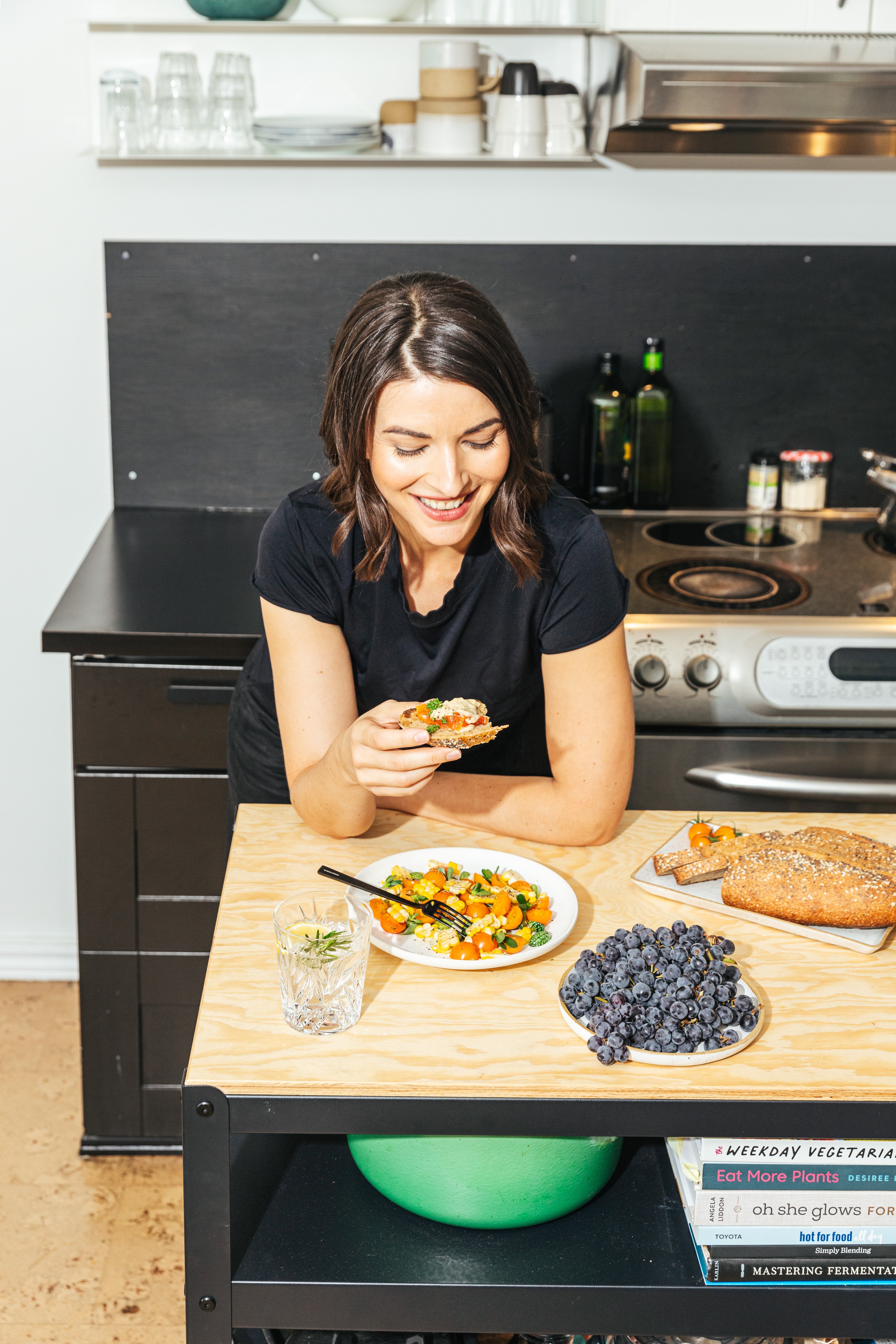If you’ve got irritable bowel syndrome, you know that travel can be a bit tricky because of food intolerances and digestive symptoms like pain, constipation and bloating. Get practical tips on traveling with IBS from a registered dietitian (with IBS herself!) so you can enjoy your vacation from planning to plane ride to your destination.

Traveling is one of the great joys of my life. I love exploring new places, shaking myself free from the routines of daily life and making new memories. But I’m also a dietitian with irritable bowel syndrome, so I know that traveling with IBS can be a real challenge.
And I’m not alone, because IBS is way more common than you think. Roughly 11% of people worldwide have irritable bowel syndrome – it’s an estimated 18% in Canada! – so important to me to create resources for folks with irritable bowel syndrome to help you feel your best.
It’s why I wrote Good For Your Gut: I wanted to show people that you can eat a flavourful, nourishing plant-based diet and improve your symptoms, all at the same time.
I typically travel a lot for work doing speaking engagements but I realized that I have never talked about traveling with IBS, so I’ve put all of my best tips here so you can be focused on enjoying your trip and not spending all your time thinking about your gut!
There is a lot of information here, so if you want to skip ahead, use this table of contents:
- Why travel is hard with IBS
- Know your IBS risks
- IBS Travel Tips: Before you go
- IBS Travel Tips: In transit
- IBS Travel Tips: At your destination
Why travel with IBS can be a challenge
Your gut LOVES routine. If your gut had its way, we would be creatures of habit. Eating and sleeping at the same time. Eating the same kinds of foods.
And, well, travel is the opposite of that. On purpose! Which means that for some folks, traveling can really mess with your gut. Even for folks without IBS, travel constipation is super common. And for folks with IBS? Well, traveling means new foods, different time zones, not always having the opportunity to go to the bathroom when you need it.
And let’s not forget the risk of traveler’s diarrhea, which can cause an IBS flare.
However – yes, there is an upside! – once you’re settled into your new destination, most people actually relax on vacation…which is VERY good for your gut!
I have been told countless times by clients that certain foods that cause them trouble at home feel symptomless when they travel. Many people think that it’s because food overseas is better quality, but the reality is that most folks are way less stressed on vacation. And because IBS is a disorder of gut-brain communication, stress reduction goes a LONG way towards improving symptoms.
Traveling with IBS: know your unique risks so you can make a success plan
Where to start? By understanding what aspects of traveling might be a challenge for you, so you can address them. Remember: we are all so different! Something that impacts you might not impact someone else…so review this list and take note of where your focus needs to be.
Stress: Whether or not you’re the type of person who feels stressed out by traveling, there are plenty of ways that it can be stressful on your body and that can exacerbate your symptoms. Like early morning flights. Trying to sleep in loud hotel rooms. Or needing to go when you simply can’t.
How to address it: give yourself EXTRA time to navigate travel. Plan your trip way in advance so you can research all your food options and itinerary. Get to the airport super early so you are not worried about missing your flight and you have tons of time for bathroom trips or unexpected hiccups. Have an IBS travel kit ready for whatever crops up. Use visualization techniques to imagine a positive travel experience.
Changes in routine: Travel disrupts routine in multiple ways from dehydration on long flights to new foods and meal times to new schedules.
How to address it: Listen to your intuition. While you don’t want to rigidly adhere to your safe foods and routines, if you know that your gut reacts poorly to change, commit to 2 or 3 home routines to stay balanced, like waking up at the same time each morning or always eating oatmeal for breakfast.
Try adjusting to your new time zone as quickly as possible by syncing up meal times and sleep schedules starting with your plane trip. At your destination, give yourself time for a morning routine, especially if you typically go to the bathroom in the morning. Have a warm drink, relax, maybe workout or meditate before your day starts.
Avoid trigger foods: Again, you need to listen to your intuition here. Ideally, you will be able to enjoy all the wonderful foods that are on offer while you are away. But if you know that certain foods – like caffeine, alcohol, spice, fatty foods, or fodmaps ALWAYS mess with your gut, you will probably have a happier vacation if you mostly avoid them.
Traveling with IBS: Before you go
The best way to avoid uncertainty and stress as you travel is to A) give yourself lots of time for planning and B) planning super thoroughly to avoid uncertainties at your destination.
- For example, try booking accommodation with a kitchen so you can self cater when you aren’t feeling well. Or, request a mini fridge in your room so you can stockpile safe snacks.
- Research restaurant options near your hotel or a few key destinations, like museums, in advance so you have a handful of options with menu items that work for you whenever you are hungry. Creating a custom Google map is amazing for this.
- If serious urgency is an issue for you, consider downloading an app that tells you where bathrooms are (and how clean they are!).
- If symptom anxiety is an issue for you, consider downloading a meditation app like o-p-e-n or a gut-directed hypnotherapy app like Nerva to help you stay calm and reduce the impact that anxiety and stress has on your symptoms.
- Prep your IBS travel kit and download meditations, favourite music and shows to keep you relaxed and distracted while you travel.
Pack your IBS travel kit
Packing a few IBS essentials will help you feel at ease and ready for anything that traveling with IBS might throw at your gut! Here are some items that may be useful when you travel.
- Water bottle: avoid single use plastics and dehydration by taking a 1 quart (1 L) water bottle with you on the road. Most airports have bottle filling stations which makes it easy to stay hydrated. Just don’t forget to pack it empty, so you can make it through security!
- Fiber supplements: eating less fibre on vacation can wreak havoc with bowel movements. Psyllium fibre can be useful for both constipation and diarrhea and can be found in travel sachets to make packing easier.
- Antidiarrheal or constipation meds: if your physician recommends medications to help you manage the diarrhea or constipation of IBS, make sure to take a supply just in case!
- Probiotics: there are a lot of IBS supplements out there…but not a lot that I actually recommend! While probiotics aren’t right for everyone with IBS, when traveling – particularly to regions where risk of traveler’s diarrhea is high – I absolutely recommend a probiotic. Start taking the probiotic the week before you leave, take it every day you are away, plus a week after you return, just in case. Important: don’t take just any probiotic. Most probiotics are overhyped without research to back them up. Here is how to choose an evidence-based probiotic.
- FODZYME: I recently discovered FODZYME and now I don’t travel without it. FODZYME is a unique, science-backed enzyme that breaks down 3 of the 5 FODMAPs in food: fructans, GOS and lactose. Because I’m plant-based, fructans in wheat are always a huge issue for me when I travel and now, instead of following a low FODMAP diet when I’m on the road, I use FODZYME and eat what I want.
- Safe foods and snacks: I am never without snacks. Part of maintaining a bit of bowel routine is to pack some safe, fibre-rich foods and snacks for when you are on the road and A) don’t have appropriate food available or B) need something extra safe if your gut is flaring up. This could be hemp hearts and instant oats for an easy hotel room breakfast. Or a low FODMAP bar like FODY foods or Belliwelli. Or almonds and dried fruit for the plane.
- Ginger or peppermint tea: Ginger tea helps with nausea and stomach emptying. Peppermint tea can help with pain and bloating. I like Traditional Medicinals for therapeutic-grade teas. They also make a Smooth Move tea to help with constipation.
- Emergency supplies: if you have real issues with urgency, consider a backup to make you feel at ease. Depends-type undergarments might be your best bet if accidents happen often. If not, a change of undies and some baby wipes might be the ‘just in case’ supplies that you rarely need but help set you at ease.
FAQ: does flying make IBS worse?
Flying can absolutely make IBS symptoms worse. If gas and bloating are an issue for you, the change in cabin pressure, along with long hours in a cramped seat can hinder digestive movement, creating pressure and pain in the gut.
If you’re constipation prone, dehydration, low fibre intake and missing your window of opportunity can really exacerbate things. Sometimes, you just need to take your doctor-recommended meds to clear it and then work on bowel healthy nutrition habits for the rest your trip so it doesn’t happen again.
Managing IBS in transit
The actual travel portion of your trip – at the airport, on the plane and in the car – is often the most challenging because travel is kind of stressful. Think long line ups, worrying about losing something at security or missing your flight connection, and sitting a long time in a cramped space. Here are a few tips for making traveling with IBS as low stress as possible.
- Arrive early to the airport – extra early. That way, if you have to urgently go in the security line up, you can just go and not worry about missing your flight. You can have time to sit down and eat your breakfast from the airport smoothie bar before you board instead of relying on plane food.
- Select an aisle seat for easy access to the bathroom. Enough said.
- Choose loose clothing for travel. Avoid waistbands at all costs…I wear a loose, long dress and keep my seatbelt loose when it’s not takeoff or landing
- Walk around a lot. If I have a bunch of time to wait, I will do slow laps of my terminal to help things move. And I try not to sit before my flight boards, preferring to stand until I am called to board since I’m going to be sitting for hours.
- If an airport has a healthy meal option, take it! Whether it’s a berry smoothie, a kale salad or a grain bowl, take the opportunity for nourishment because you aren’t sure when the next one will be.
Traveling with IBS: At Your Destination
Once you get settled, hopefully that vacation chill will set in. And if it does, trust your instincts! Go ahead and have that gelato if your gut is feeling good. Eat the pasta! But just in case things aren’t feeling amazing, consider these tips.
- Hit the market: head to the local fresh market or supermarket to grab some healthy staples like fresh fruit, precut veggies and hummus, nuts and trail mix. That way, you can keep your intake of fibre fruits and veggies up even if the food you are served isn’t super fresh.
- Keep mornings chill. For many folks with IBS, mornings are the most intense. If you can, plan structured activities for the afternoons. Leave mornings for a gentle, slow start so you can go to the bathroom at your hotel or apartment then enjoy a leisurely walk and sightseeing. If that’s not possible, like a work conference, commit to rising early, so you have one hour (or more if you need it) before you have to leave your room. Eat a safe snack or breakfast.
- Exercise: travel often involves a lot of walking, which is great for mood and gut support! However, if you are traveling for work and will have to do a lot of sitting, try and workout in the morning if that’s important for your mood and gut support. Or do a youtube yoga session in your room.
- Be smart to avoid traveler’s diarrhea: traveler’s diarrhea is no fun, and can be even worse for someone with IBS. Follow your doctor’s advice around probiotics or preventative medicine and at your destination, follow common sense advice to avoid ice cubes or uncooked vegetables if they pose a risk.
As someone with IBS, I promise that travel can feel good again. It’s a balance between self-awareness, self-care and careful planning…but it doesn’t have to be rigid or without spontaneity! What are your favourite IBS travel tips? Pop them in the comments.
The post Traveling with IBS: Advice from a Dietitian appeared first on Desiree Nielsen.














